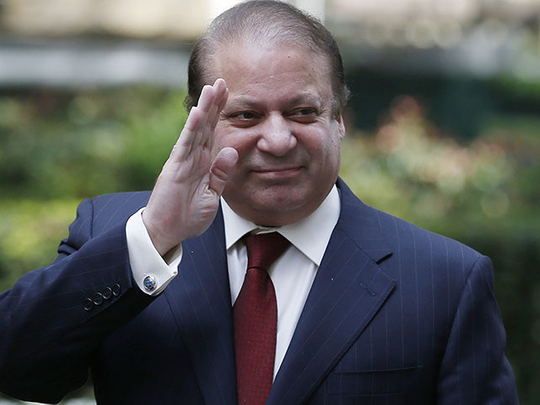
Pakistan’s Prime Minister Nawaz Sharif in the past week roared into action when he publicly claimed at a rally that he will return to lead the country in the next parliamentary elections, which are due to take place in about two years.
Sharif’s sure-footed claim followed opposition leader Imran Khan’s increasing determination to raise the ante against the government on a range of issues, notably the unresolved matter of the source of huge wealth belonging to the prime minister’s three children, revealed in the so called ‘Panama leaks’. In contrast to Sharif’s claim that the money for buying properties in central London came from the sale of his family’s businesses in the Middle East, Imran is insisting on hard evidence to back the prime minister’s claim.
But across Pakistan, there is plenty that continues to go wrong even as the prime minister and his political foes fight their political battles. As Sharif recently toured parts of the country to preside over the announcement of one new mega-project after another, his grip on key issues appeared to be loosening. Simply put, fancy new projects such as highways will just not be enough to tackle Pakistan’s toughest challenge — high incidence of poverty all across the country.
For Pakistan’s mainstream, a crisis triggered by the collapse of prices of agricultural commodities has triggered a wider malaise. Up to 60 per cent of Pakistan’s population of 200 million is known to rely directly or indirectly on farm incomes. And in the past year, agriculture has shrunk by its widest margin in almost 25 years, thereby steeply shrinking the incomes of farmers.
Yet, Sharif’s government seems roundly obsessed with establishing fancy projects such as new air-conditioned bus services and modern train lines, all in the name of modernising the country. The paradoxical nature of Sharif’s push versus Pakistan’s realities is all too obvious. The reality of Pakistan today must serve as a sobering lesson for Sharif and his supporters from the ruling Pakistan Muslim League — Nawaz (PML-N). With majority of households caught in misery, considering the crisis in the agricultural sector, all bets are off on voter behaviour in 2018. Meanwhile, the clamour over the ‘Panama leaks’ controversy continues to bring parts of an otherwise divided opposition closer — at the very least seeking a full disclosure from Sharif.
For Sharif, one reassurance must come from the populous Punjab province where the prime minister has held his political ground for years. As the province has a large number of seats in parliament, its possible that Sharif and his allies believe that their future is well secured.
Yet, it would be a major mistake to take the province for granted. Today, the PML-N indeed is in command there. But in the past, parts of Punjab, notably southern Punjab, have delivered seats to the opposition parties, notably the Pakistan People’s Party led by former president Asif Ali Zardari.
And last but not the least, as prime minister of a very diverse country with varied provincial interests, Sharif needs to consider conditions on a pan-Pakistan basis. For instance, an unsettled Karachi, the southern massive port city with a population of about 20 million, can well unsettle Pakistan. For now, security conditions in Karachi remain relatively better, following more than a year-long clampdown by the army. However, this is no substitute for long term and sustained improvement, given the breakdown of local government and rampant corruption.
Elsewhere too, parts of Pakistan, notably the northern Khyber-Pakhtunkhwa province, remains at war — between the Pakistan army and Taliban militants. The war seems to be moving ahead in the right direction given Pakistan army’s gains and the military retreat of the Taliban. However, follow-up action needs to be taken on a variety of fronts, ranging from targeted programmes for poverty alleviation to reforming key aspects of social services — notably education and health care.
On Friday came the latest evidence of a blatant disconnect between the sorry state of affairs across Pakistan and the widespread complacency among its rulers. A supposedly comprehensive directory of the taxes paid by members of parliament was finally revealed, amid suggestions that the government came around to its issuance under pressure from the International Monetary Fund, the Washington-based global lender, which has given more than $6 billion (Dh22 billion) in a loan to Pakistan just in the past three years.
The directory also revealed the cases of a number of politicians visibly flashing around much more wealth than their income tax payments would support. The more important follow-up action, however, remains shrouded in doubt and mystery. Amd that is: Will Sharif’s government investigate cases of parliament members whose visible wealth sharply exceeds the taxes paid by them? To that very central question, the answer remains negative.
For the moment, less than one per cent of Pakistan’s population of 200 million pays income tax. With that being the case, Sharif’s high spending-spree on new infrastructure projects will likely be paid through more loans that Pakistan can ill-afford. Without clamping down on the big fish, through rapid improvement in tax collections, Pakistan’s conditions will hardly even begin to improve in a sustainable way.
But is Sharif capable of being the leader who will initiate change? The likely answer to that question for now is sadly in the negative.
Farhan Bokhari is a Pakistan-based commentator who writes on political and economic matters.










